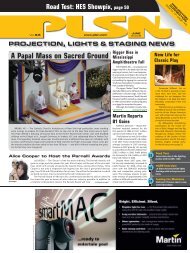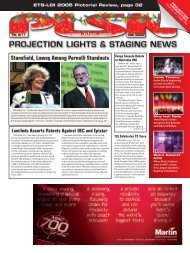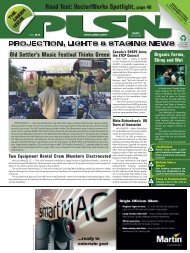September Issue - PLSN.com
September Issue - PLSN.com
September Issue - PLSN.com
You also want an ePaper? Increase the reach of your titles
YUMPU automatically turns print PDFs into web optimized ePapers that Google loves.
“Jere Harris has had his feet<br />
firmly planted in the dual galaxies<br />
of Broadway and touring production<br />
since he first burst upon<br />
the scene in the 1970s,” says<br />
Patrick Stansfield, a past Parnelli<br />
Honoree. “He’s had the savvy, vision<br />
and knowledge to build PRG<br />
resources large enough to be able to respond<br />
to vast seasonal shifts of demand in<br />
the show biz industry while still remaining<br />
responsive to the daily needs of individual<br />
productions.”<br />
Harris started working in a theatre scenic<br />
shop when he was in high school, and<br />
worked his way up from there. His first touring<br />
show was the ground-breaking Chicago,<br />
(“Still the most fun I’ve had,” he says),<br />
and he went out on his own while he was<br />
still in his 20s (“We’d get a little money, buy<br />
another table saw.”), eventually be<strong>com</strong>ing<br />
a founder of Production Resource Group,<br />
one of the world’s foremost entertainment<br />
technology <strong>com</strong>panies that spans almost<br />
every aspect of this business and covers<br />
the globe.<br />
“I’m a bit taken a back,” Harris says<br />
about receiving the industry’s highest<br />
honor, the Parnelli Lifetime Achievement<br />
Award. “My success is not based on me, but<br />
on the team of people I’ve been able to surround<br />
myself with.”<br />
His career has been trademarked by<br />
his talent, people skills and solid business<br />
sense—and those who know best point out<br />
that rarely have all three been equally represented<br />
in one person. Add to those qualities<br />
the instincts that lead him to expand<br />
into new horizons. Most people would<br />
have been content to have his Broadway<br />
credentials and been happy with that, but<br />
Harris had a wandering eye, moving into<br />
other areas before it was “cool” to do so.<br />
“I would say that all the new markets<br />
we’ve gotten into in the last 25 years,<br />
the different projects we’ve done, has<br />
paid off exponentially in the markets we<br />
were already in,” Harris says of his history<br />
of diversifying. “This industry is not<br />
definable in a book or a two-year grad<br />
program. It’s an industry that requires<br />
experience. The more experience, the<br />
more qualified you be<strong>com</strong>e.”<br />
By KevinM.Mitchell<br />
All in the Family<br />
Born Jeremiah Joseph Harris on <strong>September</strong><br />
8, 1954, he came into the world<br />
with theatre-imprinted DNA. His great<br />
grandfather was a theatre manager in England,<br />
and his grandfather was a <strong>com</strong>pany<br />
manager for the great George Abbott. His<br />
dad is four-time Tony Award-winning producer<br />
Joseph P. Harris, whose 200+ Broadway<br />
shows include Chicago and Dancing at<br />
Lughnasa, among many others. His mom is<br />
actress Geraldine Delaney Harris who was<br />
featured in the likes of Guys and Dolls and<br />
Silk Stockings.<br />
With a pedigree like that, it is not surprising<br />
that all four of Joseph and Geraldine’s<br />
children ended up in the business.<br />
It makes one wonder if it wasn’t the reverse<br />
in a household like that—that there<br />
was pressure to go into the theatre, not<br />
run from it as perhaps the stereotypical<br />
parent might advocate.<br />
“They never encouraged us to be in<br />
the theatre business,” Harris tells. “All of<br />
us were free to do whatever we wanted.<br />
Though I think they were a little surprised<br />
when we did decide to go into theatre,<br />
especially since we all ended up on the<br />
technical side.”<br />
Harris says he never considered anything<br />
but the technical side, and instead<br />
of flipping burgers like the typical 16-<br />
year-old would do in the summer, he was<br />
able to work for Pete Feller in a Broadway<br />
scene shop. “He was one of the innovators<br />
of Broadway theatre, and had a great<br />
presence. There were a lot of characters<br />
in the business, even more than we<br />
have now, and being around those guys<br />
I learned not only a lot about the craft,<br />
but about life.” Harris would adopt from<br />
Feller the elder’s renowned never say die,<br />
always figuring out a way to make it work<br />
philosophy. “We stayed days and nights to<br />
make something work. His great love and<br />
great passion for the theatre is a big part<br />
of my success.”<br />
He continued to work for Fellers during<br />
college, but by the late 1970s he would<br />
leave both when Theatre Now, the largest<br />
Broadway theatre management <strong>com</strong>pany<br />
during the 1970s and 1980s, offered him<br />
a production manager job. He spent the<br />
next seven years there.<br />
“The sheer volume of shows we did<br />
was pretty remarkable,” he says. “It was<br />
at least 15 to 20 a year. But the highlight<br />
was all the people I worked with. It was<br />
an amazing group.” CBS President Les<br />
Moonves was there, as was Paramount<br />
head Gail Berman.<br />
28 <strong>PLSN</strong> SEPTEMBER 2006<br />
www.<strong>PLSN</strong>.<strong>com</strong>
















